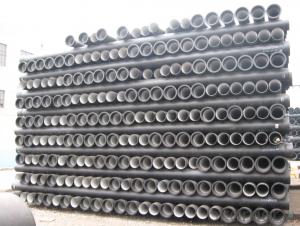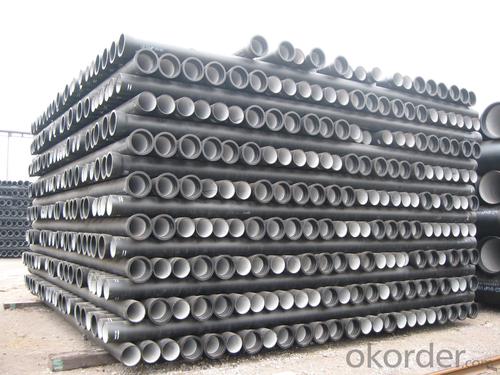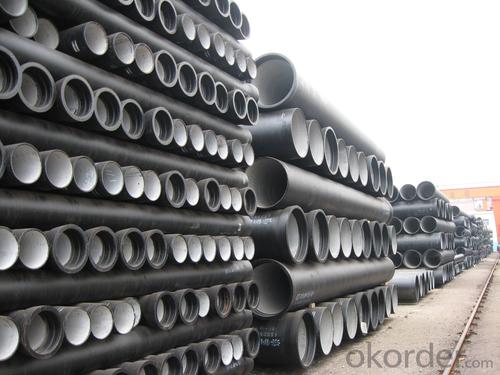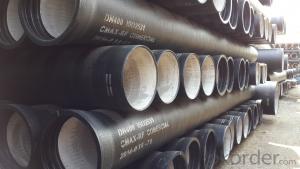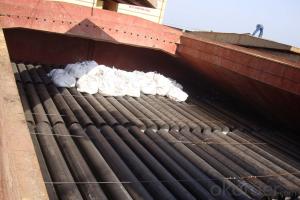Ductile Iron Pipe DN200
OKorder Service Pledge
Quality Product, Order Online Tracking, Timely Delivery
OKorder Financial Service
Credit Rating, Credit Services, Credit Purchasing
You Might Also Like
Specifications
Quick Details
| Place of Origin: | China (Mainland) | Brand Name: | CMAX | Model Number: | T type / K type / Flange type |
| Length: | 6m / 5.7m / Negotiable | Standard: | ISO2531 / EN545 / EN598 | Application: | Potable / Sewage water |
| Diameter: | DN80~DN2200 | Shape: | Round | Hardness: | 230 |
| Pipe Wall Thickness: | standard | Pull Strength: | 420 | Yield (≥ MPa): | 300 |
| Material: | Ductile Iron | Type: | Centrifugal ductile cast iron pipe | Certification: | ISO2531 / EN545 / EN598 |
| Outer Diameter: | 80-2200 | Thickness: | standard | Specification: | DN80~DN2200 |
| |
The advantages to the customer:
Trustworthy financial strength.
One-stop shopping.
Fast and efficient service.
Coordination of shipments from multiple plants.
Specialists of the overseas shipping process.
A more competitive price.
- Q: Are ductile iron pipes suitable for irrigation systems?
- Yes, ductile iron pipes are suitable for irrigation systems. They are known for their strength, durability, and corrosion resistance, making them a reliable choice for transporting water in agricultural settings. Additionally, ductile iron pipes can withstand high pressure and are resistant to external loadings, making them ideal for irrigation systems that require efficient water distribution.
- Q: What is the lifespan of ductile iron pipes?
- The durability and longevity of ductile iron pipes can vary depending on several factors, including pipe quality, installation conditions, and the surrounding environment. On average, these pipes typically last between 50 and 100 years, making them an excellent choice for water and sewer infrastructure. By implementing proper maintenance practices and conducting regular inspections, ductile iron pipes can remain highly functional and efficient for many decades. It should be noted that factors such as corrosion, soil conditions, and water chemistry can influence the lifespan of these pipes, so it is important to monitor and address these issues in order to extend their longevity.
- Q: How does ductile iron pipe perform in seismic conditions?
- Ductile iron pipe is known for its excellent performance in seismic conditions. It has proven to be a reliable and durable choice for underground water and wastewater systems, especially in areas prone to earthquakes. The inherent strength and flexibility of ductile iron pipe make it highly resistant to seismic forces. It can withstand ground movements and vibrations caused by earthquakes without significant damage or failure. This is due to its unique composition, which includes a high percentage of iron combined with small amounts of carbon and other alloying elements. The ductile iron pipe's ability to absorb and dissipate seismic energy through its inherent flexibility is crucial in seismic conditions. When the ground shifts during an earthquake, the pipe can adjust and deform slightly to accommodate the movement, thus minimizing stress concentrations and the risk of fractures. Moreover, ductile iron pipe has excellent joint integrity, which is vital in seismic conditions. The joints are designed to provide maximum strength and resistance against external forces, including seismic activity. Various joint types, such as push-on, mechanical, and restrained joints, are available to suit different seismic requirements and installation conditions. In addition to its mechanical properties, ductile iron pipe also offers long-term corrosion resistance. It is typically lined with a cement mortar or a protective coating, which acts as a barrier against corrosive elements in the soil or water. This corrosion resistance ensures the pipe's structural integrity and longevity, even in areas with high seismic activity. Overall, ductile iron pipe has a proven track record of performing exceptionally well in seismic conditions. Its strength, flexibility, joint integrity, and corrosion resistance make it a reliable choice for underground infrastructure, providing safe and efficient water and wastewater systems in earthquake-prone regions.
- Q: Can ductile iron pipes be used in seismic zones?
- Yes, ductile iron pipes can be used in seismic zones. Ductile iron pipes are known for their strength and flexibility, making them capable of withstanding seismic activities. They have the ability to absorb and distribute the energy generated during an earthquake, reducing the risk of pipe failure or damage. Additionally, proper installation and design considerations, such as using flexible joint systems, can further enhance the seismic resistance of ductile iron pipes in these zones.
- Q: Is the fire hose capable of using rapid repair joints?
- Lubrication. Edible oil can be used as lubricant and evenly brush on the socket end and rubber ring.
- Q: How do ductile iron pipes handle soil movement?
- Ductile iron pipes are renowned for their exceptional strength and durability, rendering them highly adept at managing soil movement. These pipes are engineered to withstand the external loads and pressures arising from soil settlement, ground shifting, or other environmental elements. A significant characteristic of ductile iron pipes lies in their flexibility. Unlike inflexible materials such as cast iron or concrete pipes, ductile iron pipes possess a certain degree of elasticity, enabling them to endure soil movement without succumbing to cracks or fractures. This flexibility empowers the pipes to absorb the stresses imposed by the soil, effectively preventing any substantial harm to the pipeline system. Furthermore, ductile iron pipes exhibit remarkable tensile strength, allowing them to resist the pulling forces that arise from soil movement. The pipes can endure the expansion and contraction of the surrounding soil, thereby diminishing the likelihood of pipe deformation or failure. Additionally, ductile iron pipes are frequently installed using proper bedding and backfilling techniques to further enhance their capacity to handle soil movement. Adequate bedding materials, such as crushed stone or sand, are utilized to deliver stable support to the pipes and distribute the external loads uniformly. This serves to minimize the impact of soil movement on the pipes and uphold their structural integrity. In conclusion, ductile iron pipes are purposefully designed to proficiently manage soil movement by virtue of their flexibility, high tensile strength, and appropriate installation methods. These pipes can effectively endure the stresses generated by soil settlement, ground shifting, or other soil-related factors, ensuring dependable and long-lasting performance in a variety of environmental conditions.
- Q: Can ductile iron pipes be used for slurry transportation?
- Yes, ductile iron pipes can be used for slurry transportation. Ductile iron pipes are known for their high strength and durability, making them suitable for various applications including slurry transportation. Slurry is a mixture of solid particles and a liquid, which can be abrasive and corrosive. Ductile iron pipes have excellent resistance to abrasion, corrosion, and erosion, making them capable of handling the challenges posed by slurry transportation. Additionally, ductile iron pipes offer a smooth inner surface, reducing friction and improving the flow of slurry. Therefore, ductile iron pipes are a reliable choice for slurry transportation systems in industries such as mining, wastewater treatment, and oil and gas.
- Q: How do ductile iron pipes perform in extreme weather conditions?
- Ductile iron pipes are renowned for their outstanding performance when faced with harsh weather conditions. Crafted from an iron alloy infused with small quantities of carbon and other elements, these pipes exhibit unparalleled strength and resilience, rendering them highly impervious to the effects of extreme weather. In soaring temperatures, ductile iron pipes maintain their structural integrity without succumbing to softening or deformation, unlike certain other materials. This ensures that the pipes continue to function optimally and reliably, even in scorching heat. Furthermore, these pipes boast a remarkable resistance to thermal expansion, thereby minimizing the risk of pipe distortion or joint failure during temperature fluctuations. When confronted with frigid conditions, ductile iron pipes also excel. They possess a low coefficient of thermal expansion, translating to a reduced likelihood of cracking or fracturing due to freezing temperatures. Moreover, their robustness and flexibility enable them to withstand the pressure exerted by freezing water inside the pipes without incurring significant damage. In addition, ductile iron pipes exhibit superb corrosion resistance, demonstrating their ability to withstand the detrimental effects of harsh chemicals, saltwater, and other corrosive substances that may be present in extreme weather conditions. This corrosion resistance ensures the longevity and dependability of the pipes, preventing leaks and preserving water quality. In terms of durability, ductile iron pipes are designed to endure heavy loads and external stresses. Boasting high tensile strength, they display resistance to bending and breakage. This characteristic proves crucial in extreme weather conditions where heavy rainfall, powerful winds, or even seismic activities may occur. All in all, ductile iron pipes have a well-established reputation for delivering exceptional performance in extreme weather conditions. Their strength, resilience, thermal stability, corrosion resistance, and durability render them a reliable choice for a multitude of applications, including water supply, sewage systems, and industrial pipelines, even in the most challenging weather environments.
- Q: Can ductile iron pipes be used for water supply in buildings?
- Yes, ductile iron pipes can be used for water supply in buildings. Ductile iron pipes are known for their strength, durability, and corrosion resistance, making them suitable for carrying water in both residential and commercial structures. They have a long lifespan, high pressure rating, and can withstand various environmental conditions, making them a reliable choice for water distribution systems.
- Q: Is there a kind of pipe called lined ductile iron pipe? Seeking manufacturers?
- Yes, ductile pipe is divided into two kinds, one is the ductile cast iron pipe pipe socket (socket ductile pipe), which is mainly used for water supply system, namely the fire water, because of ductile iron pipe with pressure, 10kg, 12kg, 16kg. Pressure small price, a few cheaper, because pure in the production process of different, 1. sand mill 2. metal water cooling, like water, the basic is 16kg.
Send your message to us
Ductile Iron Pipe DN200
OKorder Service Pledge
Quality Product, Order Online Tracking, Timely Delivery
OKorder Financial Service
Credit Rating, Credit Services, Credit Purchasing
Similar products
Hot products
Hot Searches
Related keywords


